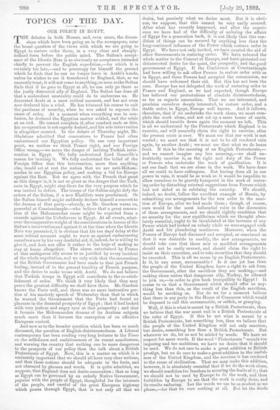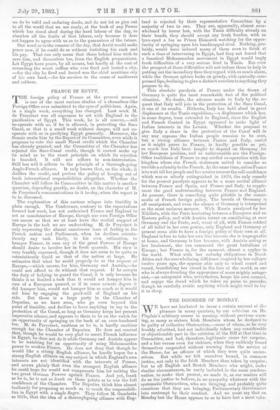TOPICS OF THE DAY
OUR POLICY IN EGYPT.
THE debates in both Houses, and, even more, the discus- sions which have been going on in the newspapers, raise the broad question of the views with which we are going to Egypt to restore order there, in a very clear and sharply- defined form before the public mind. The Sultan's accept- ance of the Identic Note is so obviously an acceptance intended chiefly to prevent the English expedition,—for which it is certainly too late,—and to preoccupy for himself the ground which he finds that he can no longer leave in Arabi's hands, unless he wishes to see it transferred to England, that, as we earnestly trust, it will not come to anything, so soon as the Sultan finds that if he goes to Egypt at all, he can only go there as the justly distrusted ally of England. The Sultan has done all that a malevolent neutrality could do to embarrass us. He decorated Arabi at a most critical moment, and has not even now declared him a rebel. He has trimmed his course to suit the partisans of anarchy, when he was asked to espouse the cause of order. At a moment when everything was in con- fusion, he declared the Egyptian matter settled, and the crisis at an end. He cannot complain if, after conduct such as this, his co-operation is not eagerly desired, and his sole intervention is altogether scouted. In the debate of Thursday night, Mr. Gladstone admitted that concessions to France had often embarrassed our Egyptian policy. On one very important point, we confess we think France right, and our Foreign Office wrong,—we mean the danger of inviting Turkish inter- vention in Egypt. We fully understand Lord Granville's reason for inviting it. We fully understand the belief of the Foreign Office that this intervention, more than anything else, would set at rest the notion that we are anti-Mahom- inedan in our Egyptian policy, and making a bid for Europe against the East. But we agree with the French that great as this danger is, it is not so great as the danger that the Turk, once in Egypt, might stay there for the very purpose which he was invited to defeat. The troops of the Sultan might defy the orders of the Sultan, if a new Khalifate were proclaimed. Or the Sultan himself might suddenly declare himself a convert to the dreams of that party—already, as Mr. Goschen warns us, powerful at Constantinople—who believe that a great renova- tion of the Mahommedan cause might be expected from a crusade against the Unbelievers in Egypt. At all events, what- ever the comparative weight of the considerations in favour of the Sultan's intervention and against it at the time when the Identic Note was presented, it is obvious that his ten days' delay at the most critical moment ought to warn us against embarrassing ourselves now by his very doubtful aid, if, indeed, he is willing to give it, and does not offer it rather in the hope of making us stay at home altogether. The alarm entertained by France of this ambiguous ally seems to us justified by every incident of the whole negotiation, and we only wish that the concessions of the British Government had been made to that just French feeling, instead of to the general timidity of French purpose, and the desire to make terms with Arabi, We do not believe that Turkish troops in Egypt will contribute to the re-estab- lishment of order. We think it very likely that they may prove the greatest difficulty we shall have there. Mr. Goschen knows the Porte well, and there was no more instructive por- tion of his masterly speech of Wednesday than that in which he warned the Government that the Porte had found no pleasure in the financial prosperity of Egypt ; that it had looked with very jealous and angry eyes at that prosperity ; and that it favours the Mahommedan dreams of its Arabian subjects much more than it favours the conception of an effective European control.
And now as to the broader question which has been so much discussed, the question of English disinterestedness. A Liberal contemporary has been reading very long lectures to the Times on the selfishness and ambitiousness of its recent manifestoes, and warning the country that nothing can be more dangerous to the prospects of our policy than the talk about a British Protectorate of Egypt. Now, this is a matter on which it is eminently important that we should all have very clear notions, and that these notions should be adequate to the facts, and not obscured by phrases and words. It is quite admitted, we suppose, that England does not desire annexation ; that so long as Egypt can be governed by an orderly Native Government, popular with the people of Egypt, thoughtful for the interests of the people, and careful of the great European highway which passes through Egypt, that is not only all that we
desire, but precisely what we desire most. But it is obvi- ous, we suppose, that this cannot be very easily secured'. After what has recently happened, and after the experi- ence we have had of the difficulty of ordering the affairs of Egypt for a generation back, it is not likely that this con- dition of things can be secured by anything less than the long-continued influence of the Power which restores order in Egypt. 'We have not only invited, we have courted the aid of other Governments in restoring order. We have referred the whole matter to the Concert of Europe, and have protested our disinterested desire for the quiet, the prosperity, and the good! government of Egypt. If the Conference at Constantinople had been willing to ask other Powers to restore order with us in Egypt, and these Powers had accepted the commission, we should have welcomed their aid. But this has not been the case. Europe has not delegated the work of restoring order tn France and England, as we had expected, though Europe has believed our protestations of absolute disinterestedness, so far as regards annexation. That we are interested, and proclaim ourselves deeply interested, to restore order, and a stable order, in Egypt, Europe well knows. And it follows, therefore, that if we undertake the work alone we must com- plete the work alone, and not set up a mere Luse of cards, which should tumble down again the moment we left. This is all we understand by the Protectorate which England is to exercise, and will assuredly claim the right to exercise, after the present crisis is over. We must see that our work is not wasted ; we must see that it is not to be all rendered vain again, by another Arabi ; we.must see that what we do bears fruit. If this be the meaning of an English Protectorate,— and we cannot imagine any less meaning,—we shall un- doubtedly exercise it, as the right am]. duty of the Power or Powers who undertake the work of pacification. It is not our fault that we are alone in the work. We have done all we could to have colleagues. But having done all in our power in vain, it would be as weak as it would be impolitic to allow ourselves to be gravely hampered in the work of restor- ing order by disturbing external suggestions from Powers which had not aided us in subduing the anarchy. We should,. indeed, no doubt, follow the excellent example of Russia, by submitting our arrangements for the new order to the sanc- tion of Europe, after we had made them ; though, of course,. ours would be the most influential voice in the discussion. of these arrangements, and we should rightly condition that no security for the new equilibrium which we thought abso- lutely essential, ought to be invalidated at the instance of any Power which had looked on calmly while we were engaged with Arabi and his plundering mutineers, Moreover, when the Powers of Europe had discussed and accepted, or convinced us. that it was desirable to modify, the new arrangements, we should take care that these new or modified arrangements should not be easily overset, and should claim the right to insist on their execution, and to take securities that they should be executed. This is all we mean by an English Protectorate. Is it, in any sense, unreasonable ? Is it one jot less than the people of the United Kingdom have a right to ask from the Government, after the sacrifices they are making,—and making alone unless that dangerous ally, Turkey, be allowed to join us,—in order to give back tranquillity to Egypt ? It seems to us that a Government which should offer us any- thing less than this, as the result of the English sacrifices, would be mocking us. Nor do we for a moment believe that there is any party in the House of Commons which would be disposed to call this unreasonable, or selfish, or grasping. Well, if this is what is meant by a British Protectorate, then, we believe that the war must end in a British Protectorate of the ruler of Egypt. If this be not what is meant by a British Protectorate, but something less, then we believe that the people of the United Kingdom will not only sanction,. but desire, something less than a British Protectorate. But whatever we do, let us not be misled by words. We have no respect for mere words. If the word "Protectorate" sounds too, imposing and too ambitious, we have no desire that it should be used. We do not care to make a great addition to British prestige, but we do care to make a great addition to the useful- ness of the United Kingdom, and the services it has rendered to the cause of civilisation. That we may make this addition, however, it is absolutely essential that if we do the work alone, we should condition for freedom in securing the fruits of it ; that we should not be used by Europe to do the work, and then forbidden by Europe to see that the work is really done, and its results enduring. Let the words we use be as modest as we please,—for that we care nothing at all, But let the deeds
we do be valid and enduring deeds, and do not let us give out to all the world that we are ready, at the beck of any Power which has stood aloof during the hard labour of the day, to abandon all the fruits of that labour, only because it does not happen to agree with us as to the guarantees of the future. One word as to the rumour of the day, that Arabi would make peace now, if he could do so without forfeiting his rank and his pay. That can only mean that those behind him wish to save him, and themselves too, from the English preparations. Let Egypt have peace, by all means, but hardly at the cost of rewarding the worst ruffian who ever fired and looted a city, —for the city he fired and looted was the chief maritime city of his own land,—for his services to the cause of mutineers and robbers.



































 Previous page
Previous page